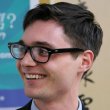It was a colder night than usual in Kaohsiung. For me, it was mildly warm, but the locals all had to wear coats because they are used to scorching hot weather. We were sitting in a tightly packed living room with a mini projector discussing a strategy to get Taiwan’s legislators to promote basic income. I was nervous because I was organizing my first ever large-scale conference based on basic income research in the Asia Pacific, and the date was quickly approaching. This was my first glimpse at the enthusiasm among Taiwan’s activists toward the idea of basic income, even though the idea was not well known in early 2017. Although the meetings did not produce much in terms of feasible strategy, it did calm my nerves that there may be potential for enough support in Taiwan to create a sustainable organization for basic income.
Fast forward to 2020 and I have been re-elected to my second term as chairman of the UBI Taiwan NGO, which researches and promotes discussion of Unconditional Basic Income (UBI). We legally founded the NGO in 2018, although we had been actively holding conferences and writing white paper policy proposals well before then. In the four years I have been in Taiwan, it has become increasingly clear that basic income is an important step to elevant Taiwanese young people to pursue their true passions and stimulate the creative energy Taiwan needs to strengthen its position globally. Many young people have told me that basic income would help them feel secure in the future and unleash their ideas. There are so many incredible talented individuals in Taiwan that do not reach their full potential because they spend long hours at jobs that do not match their skills. One of the researchers in the first summer basic income workshop told me he is volunteering because he sees basic income as critical to his own future.
With the outbreak of COVID-19, my NGO made historic progress in pushing the discussion of basic income in Taiwan. We met with several current and former national legislators over a two month period to discuss an emergency cash policy proposal I produced with my team at the height of the pandemic. They made clear the political challenges of the policy, but the pandemic has made the previously improbable open for discussion. We have seen more interest and movement in the past few months than we did in over a year, demonstrating the rare opportunity the state of the world has opened for basic income in Taiwan. Legislators told us they recognized the importance of policies to elevate Taiwan’s youth, and the meetings illustrated that the possibility is emerging for transitional or experimental policies.
As I deepened my connection to Taiwan, I have expanded my projects with the goal of cultivating opportunities for Taiwan’s youth. Since last year, I have worked as a media manager for a joint initiative between AIT and the Taiwan authorities called the Talent Circulation Alliance (TCA) which has the goal of strengthening ties between the best talent in Taiwan and the United States. We have featured female entrepreneurs and foreign business owners who are working to internationalize Taiwan. While working for this project, I have had the opportunity to meet and highlight some of the incredible entrepreneurs and talent who work in Taiwan. A common refrain they told me was that Taiwan has some of the most potential to compete in the global economy, but there must be a concerted push to further internationalize and open up to the world.
Teaching students debate in Taiwan, I met AIT Officer Ryan Engen while coaching his son. After realizing I had been a Fulbright student, he came up with the idea to collaborate with Fulbright to promote American-style debate in Taiwan and open up more opportunities for Taiwanese students to engage in this activity. Having the opportunity to give my insight on the program and help construct some of the workshop was a particularly special opportunity for me. My participation in debate was the fundamental factor that opened the professional doors in my life and allowed me to go from a small town in Kansas and to now building an NGO and pursuing a Ph.D. in Taiwan. When I was a junior in college, I had even submitted a grant application with a similar proposal to help spread debate in China. My accidental meeting with Ryan made this dream possible in Taiwan. What I have realized is that big ideas are possible if you never stop working toward your passions.
Early on when I came to Taiwan, I joined a Buddhist organization at my university. They told me that the energy I put out in the world will be reflected in my own spiritual energy and health. If we want health and happiness, we cannot forget that we are inextricably linked to the society that we are all building together. As the world becomes a stranger and more volatile place, we all have a responsibility to act as the bridge for those who want to contribute to the world and just need a push so they can open the door to their passion.
Managing Editor: Tiffany Huang 黃子儀
See more at: https://youtu.be/O0o8ix4a7uM





